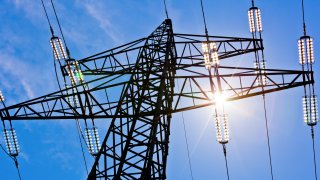
A jury that heard complicated testimony about construction schedules and constitutional rights delivered a victory Thursday for a $1 billion transmission project, concluding developers had a constitutional right to proceed despite being rebuked by state voters in a referendum.
Jurors ruled 9-0 in favor of developers when asked to decide whether enough work was completed in good faith before the referendum for developers to have a vested right to complete the project.
Based on the outcome, a state judge is expected to conclude that the referendum was unconstitutional.
The decision will be appealed to the state Supreme Judicial Court for the final say.
Get New England news, weather forecasts and entertainment stories to your inbox. Sign up for NECN newsletters.
At stake is a project touted as a bold effort to combat climate change by supplying up to 1,200 megawatts of Canadian hydropower to the New England power grid — enough electricity for about 1 million homes.
Supporters say electricity supplied by the 145-mile (233-kilometer) power transmission line would lower energy costs in all of New England as well as reduce carbon pollution. Critics contended that the benefits were overblown and that it would’ve destroyed woodlands along a new, 53-mile (85-kilometer) section carved through the woods to reach the Canadian border.
Despite winning all regulatory approvals, the project — to be fully funded by Massachusetts ratepayers — was met with pushback each step of the way. Ultimately, state voters voted against it in a referendum and work was halted.
Maine
The latest news from around the state
The Supreme Judicial Court breathed new life into the project last summer, concluding the retroactive nature of the referendum would violate the developers’ constitutional rights if substantial construction had been completed in good faith.
Justice Michael A. Duddy could have made the fact-finding determination himself. But he took the unusual step of ordering a jury trial, putting the fate of the trial in the hands of nine regular folks.
Central Maine Power’s parent company and Hydro Quebec teamed up on New England Clean Energy Connect and construction started in January 2021, about 10 months before the referendum in which 59% of voters rejected the project.
Opponents contended the developers acted in bad faith, speeding up the construction schedule to try to thwart the will of the people in the referendum. Developers said they were keeping to a schedule set years earlier.
The matter is one of two lawsuits to go before the Supreme Judicial Court.
The other lawsuit challenged leases for a 1-mile portion of the proposed power line that crossed state land. The high court ultimately ruled there was nothing improper with the lease.



